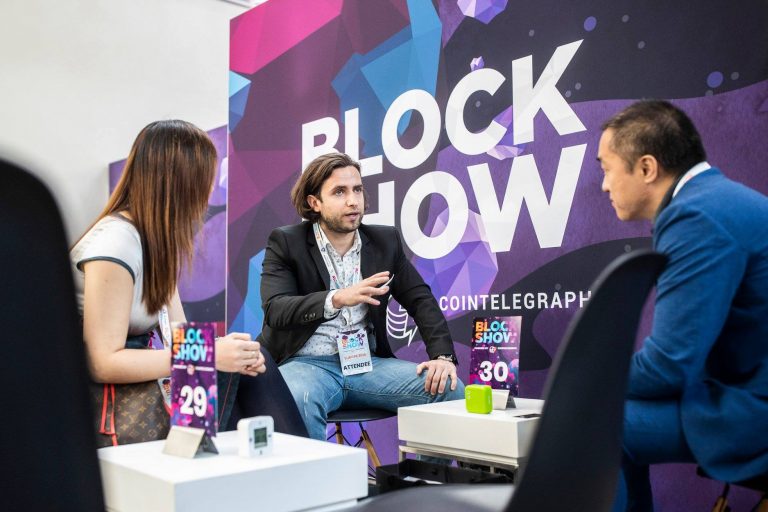More than 3000 crypto enthusiasts and investors came to Berlin to the Blockshow Europe event. It was one of the biggest blockchain conferences in Europe so far. Jimmy Wales (founder of Wikipedia), Mike Butcher (editor at Tech Crunch), Bobby Lee (co-founder of BTCC), Johanna Maska (ex-head of White House press advance for Barack Obama) and many other internationally reputed professionals shared their knowledge of blockchain and crypto topics as keynote speakers or during panel discussions.
Highlights from Blockshow Europe
Blockchain is not 100% decentralized
Many newcomers to the crypto space think that blockchain created or somehow made decentralization possible. Some might even believe that the blockchain is a guarantee of decentralization. But blockchain in our world is a centralized public database. It is decentralized within itself, but for the world out of the blockchain, it behaves as a centralized system.
What do we mean?
Imagine inserting erroneous data into the blockchain. False data is written into the blockchain database and if no-one knows that the information is incorrect, it is a problem.
This is what supply chains and related startups deal with nowadays. We can track the origin of the product on the blockchain, such as wood, gold or wool. But the more significant problem is what data you put on the blockchain.
Blockchain doesn’t solve every problem. There is a simple equation: Rubish in – Rubish out.
Let’s put it on the blockchain
Remember the times when the Internet was young? Several years after marketers first got into the space they started saying: Let’s put your company on the internet. “List it on a catalog, create a website!” etc. Now, we hear marketers advising companies with words. Let’s put your business on the blockchain.
Indeed, we are in early stage of the blockchain. There will be much bigger hype and business potential than we experienced at the end of 2017.
ICOs go for private deals first
Many ICOs try to make a private deal before opening a public crowdsale. It is important more than before because they have trust from their investors after showing them their strategic partners and venture capital companies.
Does ICO have a lock-up period?
When researching a good ICO to invest, don’t forget to search for the lock-up period. Simply, it is a period when investors cannot sell their tokens. Some ICO teams give 50% to strategic partners with no lock-up period. What happens next? They sell tokens right after the token is listed on an exchange.
Lock-up periods limit price manipulation. Check 37+ ICO listing websites and read their ratings of blockchain and crypto start-ups.
Big discussion on the Facebook crypto ad ban

We especially liked the panel discussion on the topic of banning cryptocurrency ads.
Is Facebook a private company? Can they do whatever they want? Should there be a different regulation for Facebook and for another (smaller) companies? Does Facebook have the power to destroy the whole industry by banning certain types of ads?
There are other types of questions related to this topics. Maybe those are more important.
When will Facebook approve crypto-related advertisements?
Nobody knows for sure, but some influencers think that it might be by the end of the year or sometime in 2019. It will depend on the regulation process – either ICOs self-reguate or governments will regulate them.
Mass adoption of cryptocurrency
The government plays a crucial role in the mass adoption of cryptocurrencies. Let us recall how the Internet got mainstream – the government regulated the use, speed, prices, and liabilities of internet providers.
It is happening now in the crypto space. Governments are regulating crypto providers such as crypto exchanges.
Education is the key
If we want to take crypto into the mainstream, we need to educate the mainstream. Education is more powerful than regulation.
Why are there so many hacking attacks?
Crypto exchanges are like honey pots. Even if you build your security with top experts, there will always be someone, sooner or later, who will be able to break in. Exchanges usually pay a fee of approximately 2 % to a specialized insurance company. Some of the large exchanges even have a certificate, etc. But it is just PR and marketing. The insurance contract has many conditions for crypto exchanges. If someone really wanted to insure their business as a crypto exchange in any meaningful way, the price would be astronomical.
So there will be more hacks until some government regulation is applied. Use a hardware wallet for your cryptocurrencies and tokens (such as Trezor or Ledger).
Blockshow is coming to Las Vegas in August and to Singapore in November 2018. Check the dates and agenda of the major blockchain and cryptocurrency events in our calendar events.











